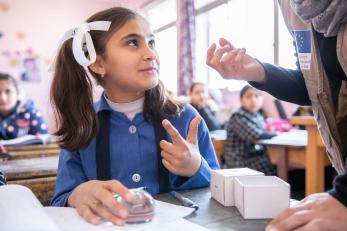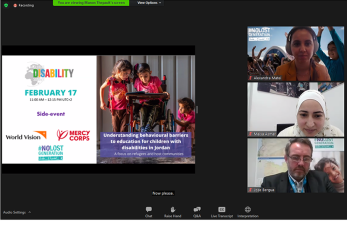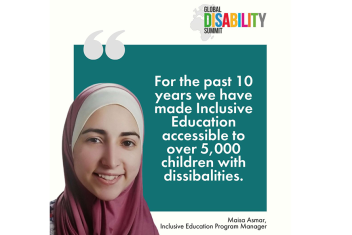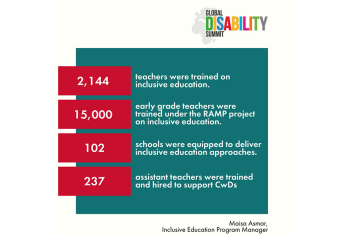Mercy Corps contributes to the Global Disability Summit side-event held in Jordan

The No Lost Generation forum organized a side-event on the occasion of the Global Disability Summit (GDS) with a focus on Behavioral Barriers to Education Faced by Syrian and Jordanian Parents of Children with Disabilities (CWDs) in Refugee Camp and Host Community Settings in Jordan.
The event paid special attention to the pandemic's impact on children with disabilities’ learning outcomes with the absence of tailored support and learning content during COVID‑19 school closures and the implementation of remote learning programs. There was also a focus in the virtual event on the secondary effects of the pandemic which have imposed mental health hardships and protection concerns amongst this target group; children with disabilities (CDWs) have been affected the most in terms of equity in access to quality education.
During the Global Disability Summit (GDS) side-event, the panelists Mrs. Maisa Asmar from Mercy Corps and Ms. Eka Shvania from World Vision displayed the major outcomes of the mutual survey conducted by Mercy Corps and the World Vision to better understand the needs and the barriers children with disabilities face in seeking education and to understand the challenges the Higher Council for the Rights of Person with Disabilities (HCD) face with the integration of CWDs in their classrooms. The study also provides key recommendations on how to improve access to quality education for these children.
During the discussion on the Inclusive education context in Jordan, Mrs. Maisa Asmar, Inclusive Education Program Manager affirmed that Mercy Corps has been an integral part of Jordan context in terms of improving the access to equal educational opportunities for children with disabilities, “For the past 10 years we have made Inclusive Education accessible to over 5,000 children with disabilities, we have trained 2,144 teachers on inclusive education approaches while 15,000 early grade teachers were trained under the RAMP project on inclusive education.” Mrs. Asmar noted.
She further mentioned, “Mercy Corps has equipped more than 100 schools to deliver inclusive education approaches - 82 in host communities, and 20 in refugee camps, we also trained and hired 237 assistant teachers in public schools to support children with disabilities.”
In her intervention on structural barriers and solutions proposed in the inclusive education study report, Mrs. Asmar outlined three main pillars that need to be available in tandem to support children's inclusiveness in education, these are accessibility, participation, and adaptations. Accessibility refers to ensuring that persons with disabilities have the means to reach school such as with the use of accommodative equipment. It also entails accessible transportation and reachable location of schools. Whereas participation focuses on providing means that allow persons with disabilities to better hear, see, read, and communicate, such as the use of assistive technology and installing braille language signs to help engage blind and deaf students.
Adaptations ensure that children with disabilities' needs are catered to in a customized and targeted way, this can include creating and providing dynamic seats, elevators for wheelchairs, and adapted classroom desks and chairs.
What children with disabilities require is equality through access, participation, and adaptation methods, therefore, according to the inclusive education study report released by Mercy Corps and World Vision, of the main proposed solutions is increasing the national budgets offered for schools to better cater to the needs of the students and train decision-makers and parents of children with disabilities on sensing, identifying, and planning for installing and providing those needs.
During the GDS side-event, Mrs. Abeer Murrar, from the Ministry of Education, reaffirmed the ample role Mercy Corps has been doing over the past years to advance inclusive education in the Jordanian public schools, in supporting the national efforts for progressing with the Inclusive Education 10-year National Strategy, and just last year, the Ministry of Education endorsed the procedural manual for Inclusive Education that was developed by Mercy Corps.
The GDS side-event in Jordan included holistic participation from the government including the Jordanian Ministry of Education and the Higher Council for the Rights of Person with Disabilities (HCD), in addition to agencies supporting persons with disabilities inclusion in Jordan and regionally and who are members of the No Lost Generation. These included the UNHCR, UNICEF, GIZ, World Vision, and Mercy Corps.
Participants reaffirmed the urgent need in Jordan and their commitment to advance the right to quality education for all children with disabilities, including Syrian refugee children who are most in need of being enrolled in quality education. The GDS participants also stressed their commitment to supporting actions that advance an inclusive and accessible quality education system for all children with disabilities, by providing the necessary resources that will allow putting plans into action with the aim that every child has the right to lifelong learning.


